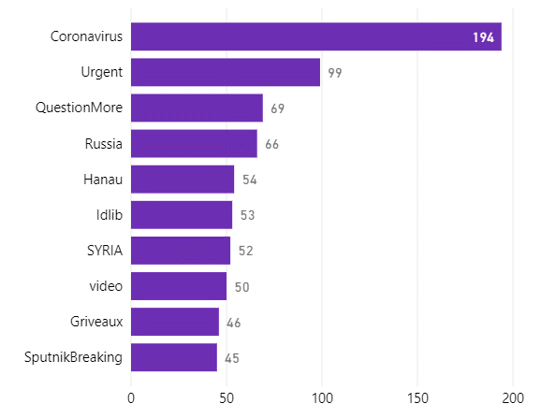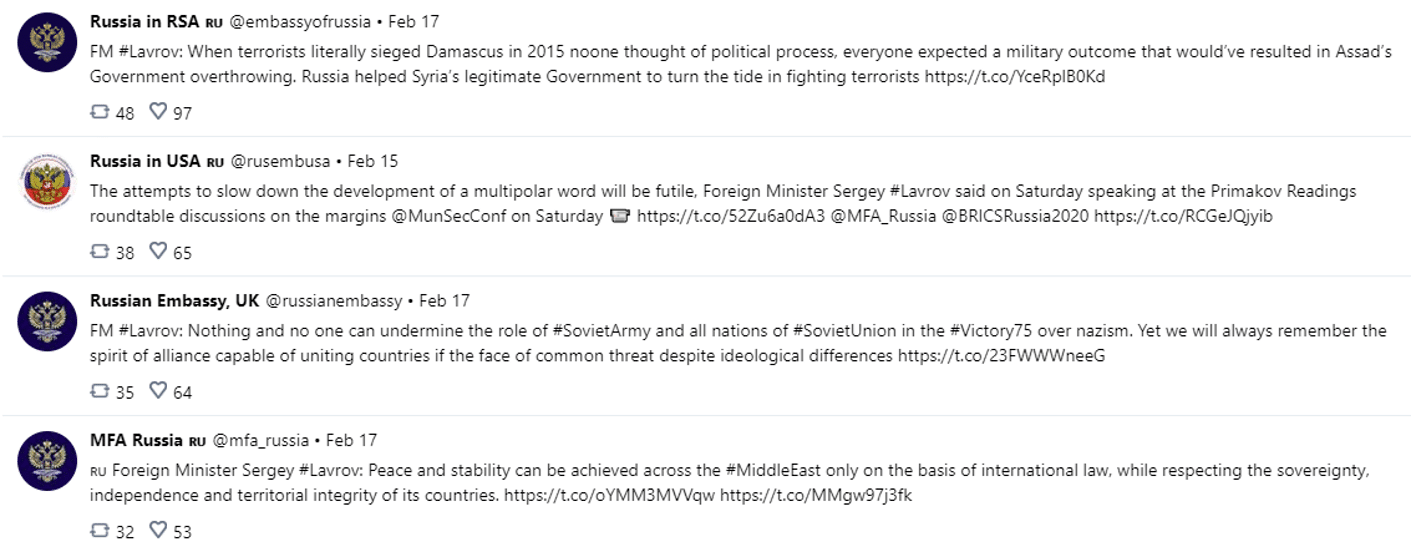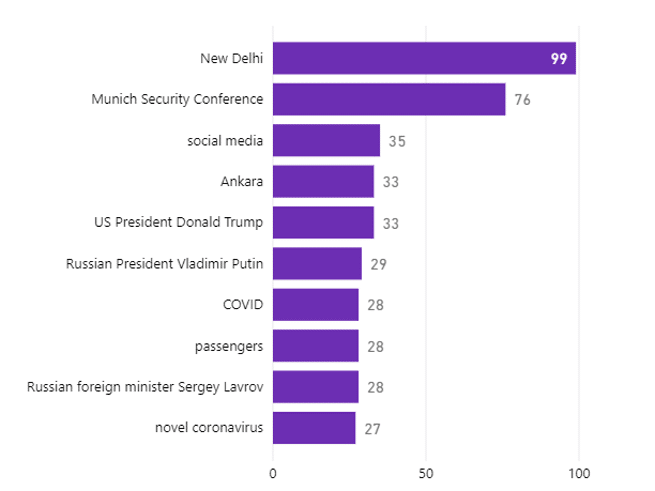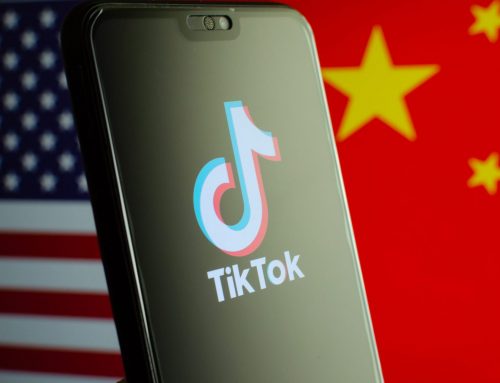From February 15-21, the novel coronavirus continued to be prominent within the Russian media ecosystem, dominating Russian state-funded media Twitter accounts. However, the number of tweets mentioning Russian Foreign Minister Sergey Lavrov, emanating in large part from Russian government and diplomatic corps Twitter accounts, surpassed in volume tweets on the virus. This push reflected geopolitical events this week that were relevant to standard Russian foreign policy messaging, particularly the Munich Security Conference and escalations in fighting in Idlib, Syria. Fewer than 30 tweets covering the Nevada Democratic presidential candidate debate and the upcoming (at the time of writing) Nevada caucus linked to a similar number of articles on monitored state-backed news websites and emphasized intra-party divisions among Democrats. A similar volume of coverage about WikiLeaks founder Julian Assange ahead of his impending extradition hearing highlighted voices viewing his treatment as an injustice.
Russian state-funded media and government and diplomatic corps accounts:
Top 10 Hashtags – February 15-21:

The top hashtag by volume this week is #Lavrov, referring to Russian Foreign Minister Sergey Lavrov, followed by #coronavirus. However, neither of these hashtags feature among the top 10 tweets as measured by likes or retweets (in data collected on Hamilton as of noon on February 21). Instead, top tweets were dominated by viral content, including animal videos and human-interest stories. In addition, we find that the tweets using #Lavrov come almost exclusively from government and diplomatic corps accounts, while #coronavirus remains the top hashtag by far for media accounts.
Russian state-funded media accounts only:
Top 10 Hashtags – February 15-21:

This disparity reflects a relatively high volume of tweets from government and diplomatic corps accounts about world events that occurred this week, including the Munich Security Conference and developments in (and related to) Syria. While nowhere close to the engagement metrics of the viral content tweets, the top overall tweet using #Lavrov is an expression of Russia’s “read[iness] to work with Turkey on Idlib at all levels” from the Russian Embassy in Ankara on February 19. This tweet reflects talks this week between Russia and Turkey amid escalating fighting in Idlib between Turkish forces and Syrian rebels, on one side, and Syrian troops backed by Russian forces, on the other:

Other top tweets using #Lavrov showcase common themes associated with Russia’s foreign policy messaging, including assertions that Russia is helping “Syria’s legitimate government,” that a multipolar world will develop, and that “attempts to distort [World War II] history” continue:


Finally, among the top ten #Lavrov tweets by retweets is one of less than ten tweets from government and diplomatic accounts about the coronavirus. This tweet is an expression of “solidarity” with China amid the epidemic, posted before Russia’s announcement that it would ban most Chinese citizens from entering Russia starting February 20 in an effort to prevent the virus from spreading:

Pivoting to coronavirus coverage from media accounts, we see approximately half of the top tweets by likes and the top ten tweets by retweets (all from either RT’s main account or its Spanish-language account) emphasize fear and violence related to the outbreak (note that @rt_com issued a correction to the second tweet, below, clarifying that not all Chinese citizens are banned from Russia, but it does not appear to have received as much engagement as the original tweet):


The other half of these top tweets, mostly from RT’s Spanish-language account (@actualidadrt) feature an unusual snowfall in Wuhan and a journalist who disappeared after covering life in Wuhan at the beginning of the outbreak.
Ahead of the Nevada caucus and around the Nevada debate, Russian state-backed media accounts posted less than 30 tweets mentioning “Nevada,” primarily pointing to a handful of stories from their corresponding websites, which are discussed in the following section of this report.
Websites
Russian government-funded websites:
Top 10 Key Phrases – February 15-21:

The appearance of “New Delhi” in this week’s top ten key phrases reflects the output of Sputnik News related to India, with no obvious overarching narrative or connection between the stories, aside from a handful of stories published Friday afternoon ahead of President Trump’s visit to India. Other key phrases mentioned in the first 200 words of articles on Russian government-funded news websites are similar to the top topics seen on Twitter, including the Munich Security Conference, the coronavirus, and developments in Syria.
Coverage of the Munich Security Conference was the number one topic for Russian government-funded news website articles collected on Hamilton between February 15 and 18, reflecting output over the weekend while the conference was ongoing. The topic retained prominence through the week as other topics did not receive a similar burst of coverage. General themes from stories on the Munich Security Conference included the idea that the West is declining and criticism of the United States’ anti-Huawei (and allegedly anti-Chinese) stance, with some articles combining the two. Examples include:
“Existential angst over ‘Westlessness’ at Munich conference leaves out the West’s responsibility for its own decline,” op-ed by Helen Buyniski, RT, February 14, 2020.
“European leaders at the Munich Security Conference who blame “nationalism” for the decline of the West are confusing cause with effect. It is their hollow facsimiles of “liberalism” that sent Europeans running for the exits . . . To hear them say it, it’s not the waging of endless war to plunder the resources of poorer nations, or the attempt to demonize those world powers not invited to the cool kids’ lunch table in order to squelch dissent within the liberal democratic paradise – it’s globalism’s discontents who have ruined “the West” for everyone.”
“Pace of multipolar world’s development not to slacken due to pressure — Lavrov,” TASS, February 15, 2020.
“The attempts to slow down the development of a multipolar word will be futile, Russian Foreign Minister Sergey Lavrov said on Saturday speaking at the Primakov Readings roundtable discussions at the Munich Security Conference on Saturday.”
“West’s Global Influence Waning — Turkish Foreign Minister,” Sputnik News, February 16, 2020.
“In recent years, Turkey has taken a number of steps away from Western institutions, scaling back its aspirations to join the European Union, and attempting to build new geopolitical and security partnerships outside the NATO bloc. The West is losing its influence in global affairs and suffering a loss in trust due to its “double standards” and the growing power of Asia, Turkish Foreign Minister Mevlut Cavusoglu has suggested [at the Munich Security Conference].”
“Strange bedfellows: Pelosi finds rare common ground with Trump in denouncing Huawei at Munich Security Conference,” RT, February 14, 2020.
“A large group of US lawmakers and officials descended upon the Munich Security Conference, trying hard to yet again warn European allies of the dangers of Huawei-provided 5G and the threat to democracy it allegedly poses. All of them, regardless of party affiliation, spoke against the Chinese tech giant – with even the US House Speaker and Donald Trump’s arch-enemy Nancy Pelosi (D-Calif) sounding exactly like her hawkish Republican rivals, warning of the “digital autocracy” the company’s 5G networks might help to spread.”
“Munich conference drops Russophobic bias to plunge into anti-Chinese one — diplomat,” TASS, February 16, 2020.
“The Munich Security Conference has managed to break out of the Russophobic bias, only to plunge into the anti-Chinese one, Russian Foreign Ministry Spokeswoman Maria Zakharova said on Sunday.”
“Huawei Fears Prove Western Democracies Weaker Than China — Chinese Lawmaker to Nancy Pelosi,” Sputnik News, February 16, 2020.
“Nancy Pelosi may have it in for Donald Trump, but there’s at least one hill they are eager to die on: defending the ‘free world’ from China and its flagship company, Huawei. A Chinese politician has found a basic flaw in Nancy Pelosi’s argument against Huawei as the House Speaker rallied foreign leaders to support the US crackdown on the company.”
On the coronavirus, articles about Russia’s partial ban on Chinese nationals entering Russia emphasized China’s “calm” response to the announcement:
“Russia temporarily bans most Chinese visitors amid coronavirus epidemic,” by Bryan MacDonald, RT, February 18, 2020.
“Russian Prime Minister Mikhail Mishustin signed a decree on Tuesday evening prohibiting most categories of Chinese citizens from entering Russia. The new rules are effective from Thursday . . . However, transit visas will still be valid. Additionally, holders of business and humanitarian visas will be exempted. China has reacted calmly to the news.”
Turning to other topics, Russian state-funded news websites published fewer than 30 articles (out of about 1,500 we collected over the period) mentioning “Nevada” this week, covering the February 19 Nevada Democratic presidential debate and the lead up to the February 22 caucuses. A couple of articles highlighted concerns voiced by U.S. politicians and experts about the technology being used in the caucuses, referencing a potential repeat of Iowa’s problems:
“Repeat of Iowa caucus looms in Nevada as problems are illuminated (& ignored),” by Helen Buyniski, RT, February 17, 2020.
“The same issues that led to the Democratic debacle in Iowa earlier this month are poised to make next week’s vote in Nevada equally hellish — yet party leaders seem unwilling to connect the dots or recognize the problem. Early voters in Nevada have already faced long lines, technical difficulties, and monumental uncertainty about the voting process with voting underway since Saturday due to close Tuesday before the general caucus this coming Saturday.”
“Lawmakers Question Tech for Nevada Democratic Caucuses After Iowa Malfunctions,” Sputnik News, February 18, 2020.
“Politicians and technical experts are concerned over the Nevada State Democratic Party’s plan to use a Google calculator uploaded to new iPads to tally results during their caucuses next week in the wake of the technical difficulties met in Iowa . . . several lawmakers and experts have raised concerns as to whether the technical decisions are actually secure in the wake of the difficulties met during the Iowa caucuses, which delayed the results for several days and remained doubtful even after repeated calculations.”
Other articles leading up to the debate stuck to themes about obstacles facing Senator Bernie Sanders (D-VT) and criticized former Mayor Michael Bloomberg’s presence in the debate in a manner that insinuates the DNC is supporting him:
“With Sanders surging in the polls, Israel lobby spends big bucks to sink his chances in Nevada,” RT, February 15, 2020.
“After emerging as the Democratic frontrunner in wake of Iowa and New Hampshire primaries, Bernie Sanders heads to Nevada leading in polls but facing new opposition: the Israel lobby and its vast cash reserves.”
“Pay-to-play? Bloomberg & his deep pockets qualify for Nevada debate after DNC rule change opened door to billionaire contender,” RT, February 18, 2020.
“Michael Bloomberg will be allowed to participate in the upcoming Democratic primary debate in Nevada, thanks in part to a helpful rule change – and hundreds of millions of dollars in campaign spending . . . His qualification for Wednesday’s debate in Las Vegas was made possible by a rather accommodating rule change enacted by the DNC, which decided to drop the requirement that candidates have a strong network of donors.”
Like major U.S. media outlets, post-debate coverage on Russian state-funded websites highlighted the array of attacks leveled at Bloomberg by other candidates:
“Sanders, Warren Take Aim at Bloomberg During Nevada Democratic Debate,” Sputnik News, February 20, 2020.
“Bernie Sanders, Elizabeth Warren and other Democratic contenders all took their time to slam Michael Bloomberg in Wednesday night’s debate in Las Vegas, accusing him of trying to buy his way into the elections.”
“Bernie or bust? Bloomberg took a beating from ALL the Democrats at the Nevada debate, but it’s Sanders’ race to lose,” op-ed by Danielle Ryan, RT, February 20, 2020.
“Mike Bloomberg walked onto the debate stage in Nevada expecting, after weeks of controversy, that the knives would be out and pointed in his direction – but he probably didn’t expect to walk away as bloody and bruised as he did. With Bernie Sanders opening a double-digit lead in the national polls, Joe Biden receding into irrelevance, and centrists like Amy Klobuchar starting to lose their shine, moderate Democrats and media pundits were hoping Bloomberg could swoop in and offer a ‘realistic’ alternative to Sanders’ scary socialism. They were sorely disappointed.”
Finally, the government-funded news websites published about the same number of articles about WikiLeaks founder Julian Assange and his upcoming extradition hearing as about Nevada. These articles play up the allegedly inhumane conditions in which Assange is being kept, as well as views that his treatment is political and represents a threat to democracy:
“‘Doctors for Assange’ worry he may die in UK prison having ‘effectively been tortured to death,’” RT, February 18, 2020.
“Over 100 doctors are urging the UK government to stop the “psychological torture” of Julian Assange, and send him to a hospital. It’s their fourth such letter since the journalist appeared in court.”
“Assange Charges ‘Soil, Deface Most Sacred, Sacrosanct, Votified’ EU Human Rights Laws,” opinion, Sputnik News, February 20, 2020.
“As Julian Assange’s lengthy extradition hearing nears, numerous obstacles have arisen capable of blocking his deportation to the US, including changes in UK law and powerful human rights laws in Brussels – if the case, or Assange, can make it that far, a journalist told Sputnik on Thursday.”
“Australian MPs Blast Treatment of Julian Assange as a ‘Threat’ to Democracy,” by Mohamed Elmaazi, Sputnik News, February 18, 2020.
“Two Australian MPs have slammed the imprisonment of the prominent Australian journalist in a key visit to the UK amid two crucial hearing in late February in Woolwich, where the Wikileaks founder could face extradition to the US and up to 175 years in prison for publishing leaked information on war crimes in Iraq and Afghanistan.”
“‘Journalism is not a crime’: Australian MP says charges against Assange must be dropped after visiting him in UK prison,” RT, February 20, 2020.
“Continued persecution of the WikiLeaks co-founder is a “crazy situation,” Australian lawmaker George Christiansen told RT, adding that Julian Assange did not commit any crime aside from running afoul of US elites.”
Broadcasts
Russian state-owned media:
Russian state-owned media broadcasts did not display a singular narrative push this week, instead taking on an array of common topics or themes, including controversies involving Western media outlets, criticism of the U.S. killing of Soleimani, U.S. sanctions over the Nord Stream 2 oil pipeline, and Western countries’ actions in Syria:
“Trump memo to Congress on Soleimani revealed,” RT America, February 17, 2020.
“Historian and journalist Gareth Porter joins Rick Sanchez to discuss the debunking of the Trump Administration’s pretext for assassinating Quds Force Commander Qasem Soleimani.”
“US meddling in European energy policy with Nord Stream 2 sanctions,” RT America, February 18, 2020.
“The $11 billion Nord Stream 2 gas pipeline, which links Russia with European consumers via Germany, is once again facing scrutiny and sanctions from the United States, dividing Europe. Germany criticized US interference in the EU’s energy policies.”
“Leaked documents outline British governments propaganda efforts in Syria,” RT UK, February 20, 2020.
“’It’s essentially the British government trying to push through their own narrative through these journalists.’ RT correspondent Eisa Ali details the leaked document revealing British use of ‘citizen journalists’ for propaganda efforts in Syria.”
“WSJ journalists expelled from China over ‘racist, ignorant’ op-ed,” RT America, February 19, 2020.
“As global concern remains surrounding COVID-19, also known as novel coronavirus, China is confirming it has expelled three Wall Street Journal reporters over an op-ed published earlier this month. The article was heavily criticized after it referred to China as “the real sick man of Asia”, as the country works to combat a deadly virus that has killed more than 2,000 people.”
“The Guardian glosses over Julian Assange in freedom of the press article,” RT UK, February 18, 2020.
“The Guardian publish press freedom article yet fail to mention Julian Assange or his upcoming hearing. Journalist Neil Clarke wonders if this is a glimpse of the future of freedom of the press.”
The handful of collected videos on the U.S. presidential race in general seem to have little discernable spin; they speculated about the outcome of the Nevada caucus and noted the “drama” of the Nevada Democratic debate (though asking whether President Trump could be considered the winner):
“What surprises await Dems at Nevada caucuses?” RT America, February 17, 2020.
“Will former Vice President Joe Biden finally score a victory in the 2020 Nevada Democratic presidential primary? And who has the best chance of beating President Trump in the general election? Attorney David Katz and Ned Ryun of American Majority join News.Views.Hughes to weigh in. They also discuss the possibility of a Bloomberg-Clinton ticket.”
“Was Trump real winner of Dems’ debate?” RT America, February 20, 2020.
“Conservative commentator Rory Riley-Topping and civil rights attorney Robert Patillo join Scottie Nell Hughes to react to the Wednesday Democratic presidential primary Debate ahead of the 2020 Nevada caucuses.”
“‘Deep, personal attacks’ in Democratic primary – David Shuster,” RT America, February 20, 2020.
“Political commentator and journalist David Shuster joins Scottie Nell Hughes to weigh in on the ups and downs of Wednesday’s Democratic presidential primary debate ahead of the 2020 Nevada caucuses. He considers it one of the best debates in “generations,” pointing out the “intrigue and drama” surrounding the inclusion of former NYC Mayor Mike Bloomberg in the debate.”
However, one video explores how Mayor Pete Buttigieg’s purported “deep connections with U.S. intelligence might help explain his success,” continuing a conspiratorial theme from Iowa caucus coverage that behind-the-scenes actors may somehow be supporting his rise:
“Where Did Pete Buttigieg Come From?” RT America, February 18, 2020.
“Pete Buttigieg appeared on the national stage out of nowhere during the 2016 election for the DNC chair. Now we’re being told he’s a front-runner in their primary. This might surprise any normal voters but his deep connections with US intelligence might help explain his success. Lee [Camp] delves into those ties and paints a picture of Buttigieg as more than just a political opportunist.”
The views expressed in GMF publications and commentary are the views of the author alone.






